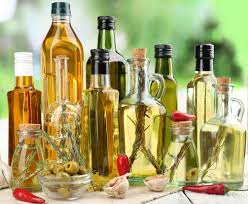Cooking oils possess a range of smoke points or temperatures at which they’re no longer stable. Therefore, cooking oils should not be used at a temperature above their smoking point.

When cooking oils are heated, particularly at high temperature, they eventually reach their smoke point. At this temperature, the oil is no longer stable and begins to break down. When oil breaks down, it begins to oxidize and releases free radicals. These free radicals can have negative health consequences, potentially causing cellular damage.
Cooking oils have their pros and cons so it is helpful to choose cooking oils based on their smoke point and degree of processing.
In traditional Ayurvedic text books, there is a mention of lot of medicated oils and their therapeutic importance have also been described.
5 Healthier Cooking Oils are:
- Cow Ghee (Clarified Butter): In Ayurveda, cow ghee is considered as one of the most sacred, spiritual and physically health benefiting substances. It has the power to assimilate effectively the properties of the ingredients added to it without losing its own properties.
- It balances Pitta dosha very well and nourishing in nature.
- In many Indian households, cow ghee is used regularly in cooking. A diet is considered incomplete without a spoonful of desi ghee.
- Desi ghee is free from trans fats unlike other oils.
- It is considered to be a better medium for cooking as it does not smoke easily.
- Mustard Oil: Mustard Oil is known as Sarshapa Taila in Ayurveda. It has been used in Ayurveda both as food and as a medicine.
- It has pungent taste and hot potency. Due to its scraping property, it is useful in managing diseases caused due to the imbalance of Kapha dosha.
- Therefore, the use of mustard oil in cooking does not increase cholesterol level and it is highly recommended for persons who have elevated lipid levels, cardiac disorders, swellings etc.
- Coconut Oil: Coconut Oil is one of the most debated dietary substances for its health benefits and hazards. It has been in use since the time of Sushruta.
- Coconut Oil is widely used in cooking especially in South India.
- According to Ayurveda, it is natural coolant in nature and nourishes the under-nourished body tissues.
- It raises the level of HDL in the body and don’t clog arteries or spike blood sugar levels. It contains medium-chain triglycerides and lauric acid which may offer benefits for heart health and weight loss.
- It has a medium smoking point therefore it does not create cancer-causing free radicals when used for cooking.
- Coconut oil works well for baking and it should be used in moderation for cooking.
- Sunflower Oil: Sunflower or Surajmukhi is one of the most beautiful flowers. The golden oil is extracted from the seeds of vibrant and cherry sunflower plant.
- Generally, it is considered as Tridoshic in Ayurveda as it balances Pitta dosha due to its subtly cooling nature.
- It is also good for balancing Vata dosha and balances Kapha dosha due to its light nature.
- Sunflower oil is also beneficial for the heart due to the presence of anti-oxidants that help to manage cholesterol levels in the blood.
- It also reduces pain and swelling due to its anti-inflammatory property.
- Sunflower oil can be used in cooking as it increases energy, boosts immune system and promotes healthy digestive system.
- Olive Oil: Olive Oil is known as ‘Jaitoon ka tel’ in Ayurveda. It is extensively used in cooking and for salad dressing.
- According to Ayurveda, it helps in balancing Vata-Kapha doshas and slightly balances Pitta dosha.
- It helps in reducing high cholesterol as it lowers total and bad cholesterol in the body as it contains healthy fat.
- It also helps in controlling diabetes by lowering the blood sugar levels and helps to manage constipation due to its laxative property.
- It has relatively low smoke point as compared to other oils so it is best for low and medium- heat cooking.
Oils that should not be used for Cooking are:
- Palm Oil
- Fish or Algae Oil
- Walnut Oil
The processing of cooking oils with artificial flavours, colouring agents should not be done as these affect both physical and mental health.
Disclaimer:-
This article is not a substitute to the standard Medical Diagnosis or personalized Ayurvedic Treatment! It is intended only for Information!
For experts consultation, please write us at care@blessayurveda.com.
1,726 total views, 1 views today